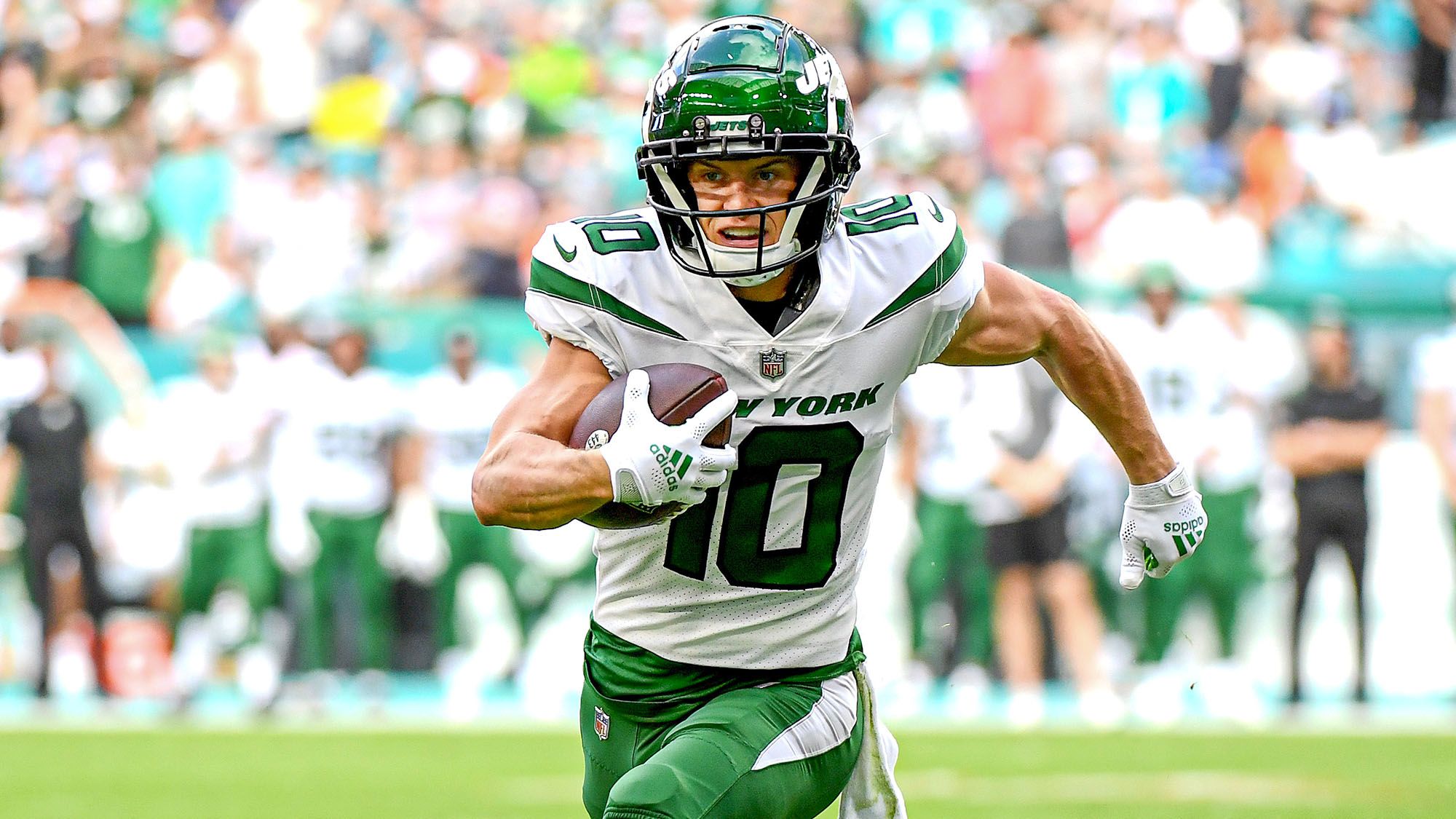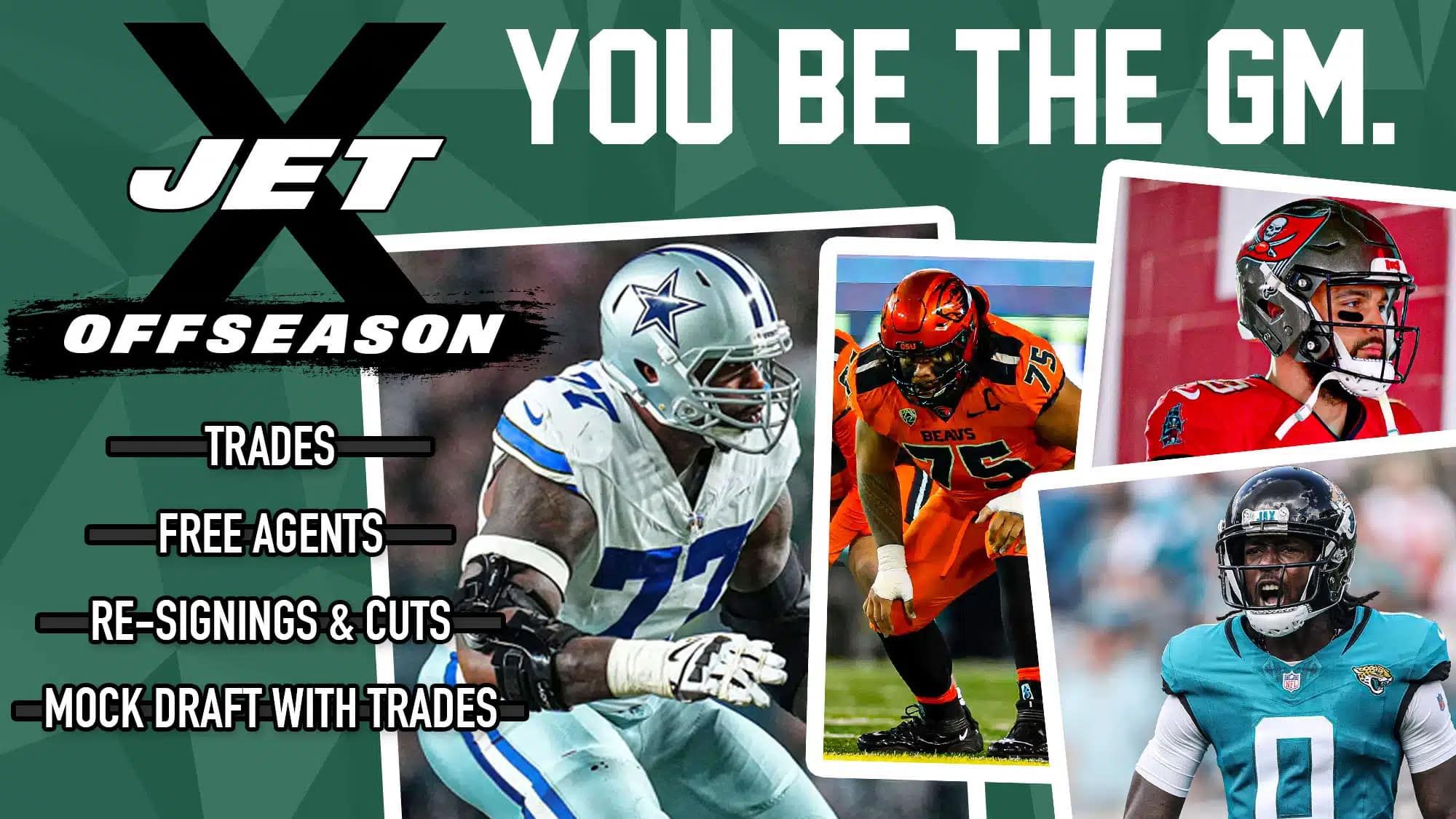- Just how important is it for the New York Jets to re-sign Braxton Berrios this offseason?
- What is the offensive X-factor and special teams ace contractually worth?
- Why is Wayne Chrebet such a fan of No. 10?
Just how important is Braxton Berrios to the New York Jets?
The New York Jets will have some difficult decisions to make this offseason.
I’m not sure re-signing Braxton Berrios should be one of them.
Sure, every player has his price, and we’ve witnessed the countless times Joe Douglas has walked away from a situation when he does not believe a player’s performance warrants the price tag.
But should he take that approach with Berrios?
The 2021 season was quite the contract year for Berrios, who earned an NFL All-Pro selection to go with that Super Bowl 53 ring he won while a member of the New England Patriots.
With Jets players falling like flies, Braxton became Zach Wilson‘s most reliable weapon before falling victim to the injury bug that has plagued the Jets during Joe Douglas’ tenure. Berrios played the Jets’ first 16 games before missing the season finale with a quad injury.
Over the course of the season, Braxton led the NFL with an average of 30.4 yards per kick return. He also racked up 471 yards from scrimmage and four total touchdowns on offense. That may not sound like a lot, but offensive production will absolutely factor into contract negotiations.
Recently, legendary Jets receiver Wayne Chrebet spoke about Berrios on The Underdog Jets Podcast.
“The thing that got me most excited was Berrios’ kickoff returned for a touchdown,” Chrebet said following the Jets’ Week 16 win over Jacksonville.
“He’s done some great things, Berrios, this year. (We) certainly know that he is a free agent-to-be, and he’s showing us how valuable he’s been as a receiver or returner. So, it’s great to see him doing well and (he’s) definitely a guy I think they need to look to lock up with a long-term deal.”
It’s hard to disagree with Wayne when he says he believes the Jets need to lock up Berrios long-term—and by long-term, I’m talking a good solid three-year contract.
Berrios’ special teams contributions alone make him a valuable piece to keep around a team desperate to get all three facets of the game—offense, defense, and specials—firing at the same time.
But we can’t undervalue just how dependable Berrios was to Zach Wilson, either.
Berrios led the Jets in two major categories when it comes to showcasing reliability on the football field. He had a 2.1% drop rate (1 drop vs. 46 catches) and caught 83.3% of his contested catch opportunities (5/6). Both numbers were the best on the team among qualified offensive players at any position.
It’s a small sample size, but that 83.3% contested catch success rate ranks Berrios as the No. 1 wide receiver in the NFL among players who received at least 40 targets (101 qualifying WRs). Moreover, of the same group of players, he was fifth-best in terms of his 2.1% drop rate and 16th-best with his 5.6 yards after the catch per reception.
Berrios was also adept at beating man coverage.
He caught 71.4% of his targets against man coverage (15/21), which ranked him 14th in the league out of 112 qualified wide receivers, making him by far the best Jets receiver at beating that kind of coverage in terms of catch rate. Next up was Jamison Crowder at 45.0% (ranking 98th).
None of this should come as a huge surprise. During his final year at the University of Miami, in which he played significant snaps for the Hurricanes, Berrios had a 70% success rate on contested catches (7/10) and a 6.8% drop rate (4 on 84 targets).
When he can play consistently, Berrios starts to get a feel for the game, and the Jets are in the perfect place to offer him more snaps heading into 2022 considering Crowder (the starting slot receiver in 2021) will also be a free agent.
I don’t want to chuck a lot of numbers at you, but in short, Berrios was a very good and very reliable receiver.
Berrios ran a 4.4 in the 40-yard dash at Miami’s pro day back in 2018 before being drafted in the sixth round by the New England Patriots. His speed is evident in both the return game and the receiving game—although in different ways.
The return game shows Berrios’ long speed. Offensively, his ability to get in and out of breaks without losing momentum shows real quickness. This is something that Chrebet touched on during The Underdog Jets Podcast.
“It’s not often that you’re going in a straight line on the field with the fact that guys like you and myself can change direction so quickly, that we get a jump on guys that have straight-line speed because we’re coming out brake, one, two steps were full speed already,” Chrebet said of Berrios. “(Defenders) aren’t even close to putting a hand on him.”
What is Braxton Berrios worth?
Now that we’ve decided the Jets should try their best to re-sign Berrios, we need to decide how much is too much and how much is just right.
One player, whose contract has been brought up as a comparison for Berrios, is Cole Beasley, but I don’t think he’ll get the same kind of money.
Beasley signed a four-year, $29 million contract with Buffalo in 2019. At that point, Beasley already had over 3,278 scrimmage yards and 23 touchdowns on his NFL resume, whereas Berrios has 1,009 yards and seven touchdowns over his three-year career to date. Comparably, over his last three seasons prior to signing, Beasley had 1,826 yards and 12 touchdowns.
By the same token Berrios has done more than Jakeem Grant, who signed a four-year, $19.7 million contract with the Dolphins in 2019. Grant had 489 yards and four touchdowns over three seasons at that point, in addition to his elite returning production.
Berrios has also done considerably more than Jamal Agnew, who signed a three-year, $14.5 million contract with the Jaguars in 2021. Agnew was a more productive returner than Berrios is, scoring five career return touchdowns in four seasons, but he only had 173 scrimmage yards and no touchdowns.
As another comparison, Brandon Wilson was a top kick returner from 2019-20 and he did not play any offensive snaps. He signed a two-year, $4.1 million contract with the Bengals before the 2021 season. Berrios is a receiving threat, unlike Wilson.
For me, I’d put Braxton’s value around the three-year, $18.5 million mark, including $9 million guaranteed, with the understanding that the Jets would play Berrios as their starting slot receiver. Crowder had a cap hit of $6.3 million in 2021 after renegotiating his deal last season, so Braxton would largely be filling the void left by Crowder moving on.
There is interest from Berrios. When asked if he’d like to remain a Jet while speaking to the official team site, he responded, “Absolutely. This locker room is full of great people, great leaders. This team has awesome staff as well. I love being here. I really do.”
It’s very difficult to get a firm grasp on Braxton’s value, but value is relative to the team. Can the Jets afford to not sign the No. 1 kick returner in the league? An All-Pro who led the team in nearly every key receiving category? A reliable receiver who developed chemistry with the franchise QB?
As long as the money is reasonable, I think the answer is no. The Jets have enough holes to fill as it is.



